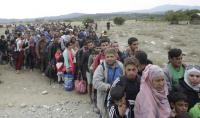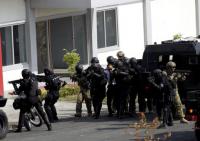-
Che Guevara era ends: FARC ratifies Colombia peace accord, ending 52-year war

Colombia’s FARC rebel group on Thursday voted unanimously to approve a peace deal with the government, officially declaring an end to the 52-year war. The insurgent group now prepares to transform itself into a new political party. The title of one article offering an analysis of the momentous even captured it all: “Che Guevara era closes as Latin America’s oldest guerrilla army calls it a day.” “This is an agreement with the last of the great guerrilla movements that emerged in the context of the cold war,” says one expert. “There might be other episodes, but strategically the armed project, the armed utopia, is closing its cycle with FARC.”
-
-
Will Colombia’s peace deal get the people’s vote?
On 26 September 2016, the Colombian government and the Fuerzas Armadas Revolucionarias de Colombia (FARC) will sign a formal agreement to end fifty years of conflict. The agreement is precedent-setting in several ways. It will be the first negotiated end to a civil conflict in the world under the new international standards of the 2002 Rome Statutes to hold accountable armed combatants who commit grave human rights abuses. It will also be the first peace process to have included victims at the negotiating table. In another innovation, it extends the special justice system to other sectors of the society beyond the FARC, such as civilian sponsors and financiers of paramilitary forces, as well as the government’s security forces. Finally, it will be the first end to a civil war that does not rely primarily on amnesty for all sides, but instead provides new forms of restorative justice. This is a compromise effort to reach peace while also holding perpetrators of human rights abuses accountable, and I believe could serve as a model for the world.
-
-
Abnormalities found in drinking water in Texas’s Eagle Ford Shale region
Chemists studying well water quality in the Texas’s Eagle Ford Shale region found some abnormal chloride/bromide ratios, alongside evidence of dissolved gases and sporadic episodes of volatile organic compounds, all indicative of some contamination from industrial or agricultural activities in the area.
-
-
Adviser to EU top court recommends removing Hamas, Tamil Tigers from EU terror watch list
The advocate-general of the European Court of Justice on Thursday advised the court that Hamas and the Tamil Tigers should be removed from the EU’s terror list. He emphasized that the recommendation is the result of his conclusion that the EU governments followed an improper procedures when they decided to add the two groups to the organization’s terror watch list.
-
-
Radioactive wastewater enters Florida major aquifer after huge sinkhole opens up below fertilizer plant
At least 980 million liters of highly contaminated water — including radioactive substances – has leaked into one of Florida’s largest sources of drinking water. The leak was caused by a huge sinkhole which opened up beneath a fertilizer plant near Tampa. The sinkhole caused highly contaminated waste water to pass into an aquifer which supplies much of the state. The waste water contained phosphogypsum, a by-product of fertilizer production, which contains naturally occurring uranium and radium. the Floridan aquifer aquifer underlies all of Florida and extends into southern Alabama, Georgia, and South Carolina, supplying groundwater to the cities of Tallahassee, Jacksonville, Gainesville, Orlando, Daytona Beach, Tampa, and St Petersburg.
-
-
Assessing the risk from Africa as Libya loses its chemical weapons
Libya’s remaining chemical weapons left over from the Gaddafi regime are now being safely disposed of in a German facility. This eliminates the risk of them falling into the wrong hands. But can these same hands acquire weapons of mass destruction from the rest of Africa? The disposal of Libya’s chemical weapons has lowered the risk of weapons of mass destruction in Africa. But we have seen how far non-state actors are willing to go to either produce or steal such weapons. For example, analysts envision militants known as “suicide infectors” visiting an area with an infectious disease outbreak like Ebola purposely to infect themselves and then using air travel to carry out the attack. Reports from 2009 show forty al-Qaeda linked militants being killed by the plague at a training camp in Algeria. There were claims that they were developing the disease as a weapon. The threat WMD pose cannot be ignored. African countries, with help from bilateral partners and the international community, have broadened their nonproliferation focus. They will need to keep doing so if the goal is effectively to counter this threat.
-
-
NIST’s regional approach to addressing U.S. cybersecurity challenge
NIST has awarded grants totaling nearly $1 million for five projects that are taking a community approach to addressing the U.S. shortage of skilled cybersecurity employees. The NIST-led National Initiative for Cybersecurity Education (NICE), a partnership among government, academia, and the private sector, will oversee the grants as part of its mission to support cybersecurity education, training, and workforce development.
-
-
Cleaning concrete contaminated with chemicals
In March 1995, members of a Japanese cult released the deadly nerve agent sarin into the Tokyo subway system, killing a dozen people and injuring a thousand more. This leads to the question: What if a U.S. transportation hub was contaminated with a chemical agent? The hub might be shut down for weeks, which could have a substantial economic impact. Craig Tenney, a chemical engineer at Sandia National Laboratories, is looking for better ways to clean contaminated concrete to reduce that impact.
-
-
MI6 to recruit hundreds more staff in response to advances in digital technology,
MI6, the U.K.’s overseas intelligence service, is set to recruit hundreds more digital specialists over the next four years in response to the ever-growing digital threats and challenges posed by advancing digital technology. MI6 employs 2,500 people, and the agency focuses on intelligence-gathering and operations outside the United Kingdom. MI5 is in charge of security within the United Kingdom (James Bond worked for MI6). In a rare public appearance, Alex Younger, the head of MI6, said of terrorism: “regrettably, this is an enduring issue which will certainly be with us, I believe, for our professional lifetime.”
-
-
Texas threatens to withdraw from refugee resettlement program

As part of its ongoing fight to keep Syrian refugees out of the state, Texas is threatening to withdraw from the nation’s refugee resettlement program if federal officials refuse to “unconditionally approve” a state plan requiring additional vetting of relocated people.
-
-
ISIS fired chemical shells at U.S., Iraqi troops near Mosul
U.S. defense officials say that on Tuesday ISIS has fired a shell containing mustard agent at the Qayarrah air base south of Msoul. U.S. and Iraqi troops use the base for operations against the Islamist group. No U.S. or Iraqi troops were hurt, and none has shown symptoms of exposure. One official told CNN that the agent had “low purity” and was “poorly weaponized.” A second official described it as “ineffective.”
-
-
Psychology expert: Why extremists use violence in their quest for significance

The recent attack in New York, which left 29 persons wounded, the bombings in New Jersey and the knife attack in Minnesota serve as a grim reminder that this year of blood and fury carries on. Though incomprehensible to most, these instances of seemingly rampant violence have a compelling rhyme and reason to the perpetrators. They carry out their carnage in full premeditation and after careful preparation. Theirs isn’t crime of passion, or case of temporary insanity. It is, instead, a deliberately chosen path grounded in a confidently held worldview. Based on my research, violent extremism typically requires the presence of three elements that jointly create the terrorist mindset: what I call the “N-triad of radicalization.” The three N’s are need, narrative, and network. Though it might appear random and haphazard, the violence on streets of the world’s cities is psychologically coherent. The combination of individuals’ needs, narratives, and networks forms a combustible mixture ready to explode in mayhem and murder. Taking all three elements into account may offer a reasonable, science-based approach to preventing and reversing radicalization. It may be key to interventions and programs that can stem the tide of violent extremism that seriously threatens the world’s security and stability.
-
-
TEEX Center awarded $22 million through DHS national training program

The Texas A&M Engineering Extension Service (TEEX) announced it will receive $22 million in federal funding for its National Emergency Response and Rescue Training Center (NERRTC), which provides specialized homeland security and disaster preparedness training nationwide. Since it was established in 1998, NERRTC has enhanced preparedness by training more than 560,000 emergency responders, senior officials, public works staff, and medical personnel through delivery of more than 13,000 courses to state, local, tribal, and territorial jurisdictions.
-
-
Ahmad Khan Rahami’s wife held in UAE for questioning about bomb plot
The wife of t Ahmad Khan Rahami, the man behind the bombings in New Jersey and New York, left the United States just days before the attack. The woman, whose name has not been revealed, was intercepted by United Arab Emirates authorities on Monday, where investigators are trying to determine whether she was aware of the bombing plot.
-
-
Hamas threatens Americans after State Dept. labels another leader “terrorist”
A Hamas militant issued a thinly veiled threat against Americans after the State Department officially designated a Hamas leader as being an international terrorist. The State Department’s designated Fathi Hammad as an international terrorist on Friday, saying that he used his position as a former interior minister “to coordinate terrorist cells.”
-
More headlines
The long view
What Does Netflix’s Drama “Adolescence” Tell Us About Incels and the Manosphere?
While Netflix’s psychological crime drama ‘Adolescence’ is a work of fiction, its themes offer insight into the very real and troubling rise of the incel and manosphere culture online.
A Shining Star in a Contentious Legacy: Could Marty Makary Be the Saving Grace of a Divisive Presidency?
While much of the Trump administration has sparked controversy, the FDA’s consumer-first reforms may be remembered as its brightest legacy. From AI-driven drug reviews to bans on artificial dyes, the FDA’s agenda resonates with the public in ways few Trump-era policies have.
The Center Can Hold — States’ Rights and Local Privilege in a Climate of Federal Overreach
As American institutions weather the storms of executive disruption, legal ambiguity, and polarized governance, we must reexamine what it means for “the center” to hold.
How to Reverse Nation’s Declining Birth Rate
Health experts urge policies that buoy families: lower living costs, affordable childcare, help for older parents who want more kids
Foundation for U.S. Breakthroughs Feels Shakier to Researchers
With each dollar of its grants, the National Institutes of Health —the world’s largest funder of biomedical research —generates, on average, $2.56 worth of economic activity across all 50 states. NIH grants also support more than 400,000 U.S. jobs, and have been a central force in establishing the country’s dominance in medical research. Waves of funding cuts and grant terminations under the second Trump administration are a threat to the U.S. status as driver of scientific progress, and to the nation’s economy.
The True Cost of Abandoning Science
“We now face a choice: to remain at the vanguard of scientific inquiry through sound investment, or to cede our leadership and watch others answer the big questions that have confounded humanity for millennia —and reap the rewards.”
